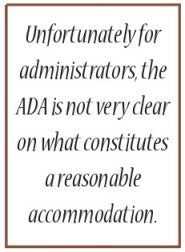'Reasonable Accommodation' Is Still In the Process of Being Defined by the Courts

Since the passage of the Americans with Disabilities Act (ADA), athletic and recreational organizations have been asked to provide "reasonable accommodations" to athletic opportunities for individuals with disabilities. Unfortunately for administrators of these organizations, the ADA is not very clear on what constitutes a reasonable accommodation.
In reviewing whether waiving a challenged rule or practice is a reasonable accommodation, the courts have generally taken one of two approaches. The first focuses on whether the rule or practice, without reference to a particular individual, is generally fundamental and essential. Under this approach, even if waiving the rule or practice would be reasonable under the circumstances of the particular case, the waiver would not be required if the rule or practice were found to be an essential requirement. The second approach focuses on whether granting the waiver request would be so at odds with the purposes behind the rule that it would be a fundamental and unreasonable alteration of the rule or practice.
Two recent cases show courts and athletic associations wrestling with the concept of reasonable accommodation. In Long v. Board of Education District 128 et al. [167 F. Supp. 2d 988 (2001)], Matthew Long, who suffers from manic depression, was suspended by Libertyville (Ill.) High School from all extracurricular activities after he was arrested by the local police. Although the arrest did not take place during school hours or on school grounds, Long's behavior violated the school's code of conduct, which proscribes illegal and inappropriate behavior, and encourages students to be model citizens.
Since participation in extracurricular activities was part of Long's Individualized Education Plan (IEP), Long requested that Libertyville make "reasonable accommodations" for his disability. The accommodation he requested was that he be allowed to play lacrosse and football for Libertyville, despite the fact that the school's code of conduct is applicable to all students participating in extracurricular activities. When his request was denied by the school and the board of education, Long sued under the ADA, the Rehabilitation Act and the Individuals with Disabilities Education Act.
While noting that Long would suffer irreparable harm if not allowed to practice and play with the lacrosse team for the final three weeks of the season, the court found that harm to Long could be minimized by participation in summer athletic programs not sponsored by the high school. For example, Long could participate in private lacrosse leagues or athletic camps, thus providing him with the athletic competition necessary under his IEP.
In balancing the harm Long would suffer if denied the opportunity to participate with the harm the organization would suffer if Long were allowed to compete, the court concluded that the proposed accommodation was unreasonable. In particular, the court ruled that waiving the code of conduct would fundamentally alter the purpose of the rule.
The court also had significant concerns with the legal precedent such an accommodation would set. The court suggested that allowing Long to play lacrosse and football despite his violations of the code of conduct would open the door to repeated court challenges, and send a message to other students and parents that enforcement of the codes could readily be challenged in federal court by students with behavioral problems. This would not only inhibit the uniform and consistent enforcement of codes of conduct, but would also have a disruptive impact on the school community by displacing the authority of the school administration to enforce its disciplinary rules with a federal court, thereby placing an unreasonable burden on the school.
In the second case, Kling v. Mentor Public School District [136 F. Supp. 2d 744 (2001)], the parents of Jeffrey Kling sued the Mentor School District and the Ohio High School Athletic Association (OHSAA) when the school district refused to include participation on Mayfield High School's cross-country team in Kling's IEP.
Kling was born with a hearing impairment and cerebral palsy, which impairs his fine and gross motor skills. As a result of his disabilities, he did not start second grade until he was approximately 10 years old. When Kling reached his junior year in high school, his parents met with school officials to talk about his academic needs and his continued participation on the cross-country team. There they were told of OHSAA Bylaw 4-2-1, which states that "if a student enrolled in high school attains the age of 19 before Aug. 1, that student shall be ineligible to participate in high school interscholastic athletics for the school year commencing in that calendar year." The purposes of the so-called Age 19 Rule are to prevent unfair advantages to one team or one team member, to help ensure the safety of all participants and to put every school on a level playing field.
Since Kling would turn 19 prior to Aug. 1, 2001, the only way the OHSAA would allow him to participate is "if the IEP mandates participation and it is deemed necessary to Jeff's progress," according to the association. However, since the school district failed to mandate participation, Kling was declared ineligible to participate on the cross-country team.
While the court acknowledged that the Age 19 Rule served a valid and important purpose, the reasons behind the rule did not apply in Kling's case. Kling typically finished last in track meets, so there was virtually no possibility that, even at age 19 or 20, he would dominate the field. Kling's participation on Mayfield's cross-country and track teams therefore would not likely provide the team with an unfair advantage.
The court also rejected the district's contention that Kling could attain the same physical benefits by just practicing with the team, but not being allowed to compete in meets. The court noted that there are extrinsic rewards that one secures by participating in high school athletics that far outweigh the benefit that one experiences by the mere physical activity of running. For example, there are awards, team yearbook photos and post-event activities to which team members are invited on a selective basis.
The only reason Kling was in violation of the Age 19 Rule was his disability. Allowing him to compete would not be "a fundamental alteration in Ohio's student-athletic rules," said the court, which concluded that Kling's IEP must include "an interscholastic athletics component that places Jeffrey Kling on the Mayfield High School cross-country and track teams."
In each of the above cases, the courts have appeared to base their decisions on whether to "accommodate" the student solely on the type and purpose of the rules challenged. But courts do not blindly find for the defendant in code-of-conduct cases, and for the plaintiff against onerous eligibility rules. For example, in a case concerning the enforcement of a disciplinary code, Bercovitch v. Baldwin School, Inc. [133 F.3d 141 (1st Cir. 1998)], the district court prevented the school from enforcing its disciplinary code against a student suffering from Attention Deficit-Hyperactive Disorder. The court held that suspending him from academic programs went "far beyond the requirements of reasonable accommodation." Similarly, the courts in Sandison v. Michigan High School Athletic Ass'n [64 F.3d 1026, 1029 (6th Cir. 1995)] and Pottgen v. Missouri State High School Activities Ass'n [40 F.3d 926, 929 (8th Cir. 1994)] ruled that the modification of an eligibility rule would be unreasonable because of the hardship it would impose on the organization.
Some direction may soon be provided to organizations and the courts, courtesy of the U.S. Supreme Court, which recently heard the second of three pending cases concerning ADA. In U.S. Airways v. Robert Barnett, the airline argued that the ADA did not permit Barnett, an injured cargo handler who could no longer lift heavy parcels, to extend his temporary stay in a less-taxing mailroom job to which his limited seniority did not entitle him. The mailroom position was vacant when Barnett was temporarily assigned to it after a back injury in 1992. However, after two employees with more seniority said they wanted to exercise their right to transfer into the mailroom, the airline told Barnett, whose 10 years' seniority entitled him only to the cargo job he could no longer perform, that it could not accommodate his needs.
While not in the sports or recreation setting, the Supreme Court's pending decision should help athletic and recreational organizations decide what is a "reasonable accommodation" under the ADA. This should not only help these organizations know when they are required to make reasonable accommodations, but also to know when to take their fight to the courts.



































